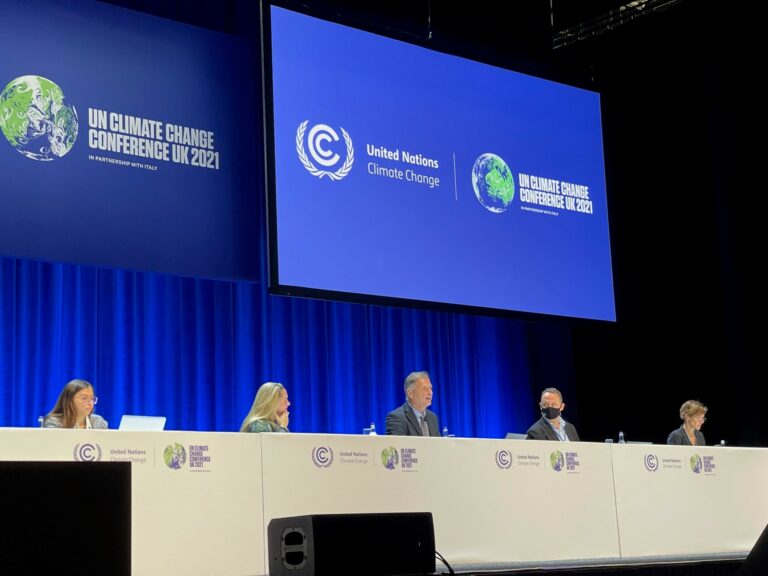Fighting climate change requires a coordinated, all-hands-on-deck approach. This calls on all stakeholders to recognise shared interests, pursue shared goals and manage shared risks. The goal of COP26 was to chart this kind of collective path forward.
At COP, IKEM joined delegates from nearly 200 other countries to create a common vision for the systemic change that would protect the future of the climate. IKEM’s representatives at the event included Director Michael Rodi, Managing Director Simon Schäfer-Stradowsky, Advisory Board member Olaf Däuper, Energy Law Team Lead Judith Schäfer, Mobility Team Lead Benjamin Grosse, Senior Research Associates Michael Kalis and Roman Weidinger, and Advisory Consultant Kate McKenzie.
Over the course of several days, IKEM representatives participated in panel discussions as experts on sustainable urban transformation. Because cities account for roughly 70% of greenhouse gas emissions worldwide, the success of climate change mitigation efforts depends on effective pathways to sustainability in urban areas. This requires large-scale changes, from low-carbon infrastructure to nature-oriented solutions to policy measures improving quality of life. Because of the concentration of social, technical, and economic capital in cities, urban areas also hold great potential for innovation.
IKEM participants were featured at several COP events, where they shared insights from their research on sustainable cities and outlined innovative, holistic approaches to carbon-neutral urban planning.
IKEM Side Events
As part of Climate Law & Governance Day on 5 November, Rodi chaired a session on the design of sustainable cities, focusing on the regulatory frameworks needed to accelerate urban decarbonisation. Topics ranged from property law and appliance regulations to the creation of urban forests and other nature-oriented solutions for more liveable cities. At the event, mayors, legal experts and other stakeholders discussed best-practice examples. Speakers included Däuper, Schäfer-Stradowsky and public officials from Cambridge, London and Bogotá.
On 6 November, IKEM hosted the Net Zero Climate Law & Governance Side Event in cooperation with the Centre for International Sustainable Development Law (CISDL), Asociación Ambiente y Sociedad (AAS) and Centro Alexander v. Humboldt. The event featured climate law and governance experts from around the world, who discussed approaches to ratchet up transparency, compliance and ambition in the context of the Paris Agreement. At the Net Zero event, Rodi emphasised the vital role of sustainable urban planning in climate mitigation efforts. ‘The fight against climate change will be won or lost in cities and urban areas,’ he said. ‘That’s why we need to strengthen their capabilities, including at an international level – for example, by integrating them into the UNFCCC framework,’ he added, referring to the United Nations Framework Convention on Climate Change.
IKEM Managing Director Simon Schäfer-Stradowsky participated in the Collaboration in Sustainable Transport panel, hosted on 9 November by IKEM partner Voi Technology. He discussed various urban planning concepts, including the concept of the ‘15-minute city’, which was developed in Paris, and the ‘Wellbeing City’ envisioned by Therme Group. ‘Decarbonising urban transport systems is important, but it’s not enough,’ he said. To fight climate change, ‘we need holistic approaches like the 15-minute city that combine mobility and energy with urban planning, health and liveability.’
On 10 November, IKEM demonstrated what the abstract concept of ‘urban sustainability’ might look like on the ground. Working with Therme Art, the Sustainable Urbanisation Global Initiative (SUGi), and Balornok Primary School, IKEM planted a ‘pocket forest’ in Glasgow’s Broomfield Park. The newly planted trees provide a biodiverse environment where hundreds of species of plants, animals and fungi can flourish.
The final event featuring IKEM was the Climate Justice, Risk, and Wellbeing Roundtable on 11 November, which was hosted by the COGITO Epistemology Research Centre. Rodi participated in the session alongside professors from the Philosophy departments of the Universities of Edinburgh and Glasgow. The discussion centred around theoretical issues associated with climate risks and opportunities.
Final thoughts on COP26
Reflecting on COP, Judith Schäfer remarked on the ‘spirit of optimism’ at the event. ‘Considering the complexity of the topic and the sheer number of participants, any outcome is already an achievement,’ she said, although she expressed disappointment that ‘industrialised countries had not assumed greater leadership in financing climate change mitigation efforts in developing and emerging countries.’
Still, COP26 represents a significant step towards a sustainable future – and IKEM was honoured to play a role in this process.


